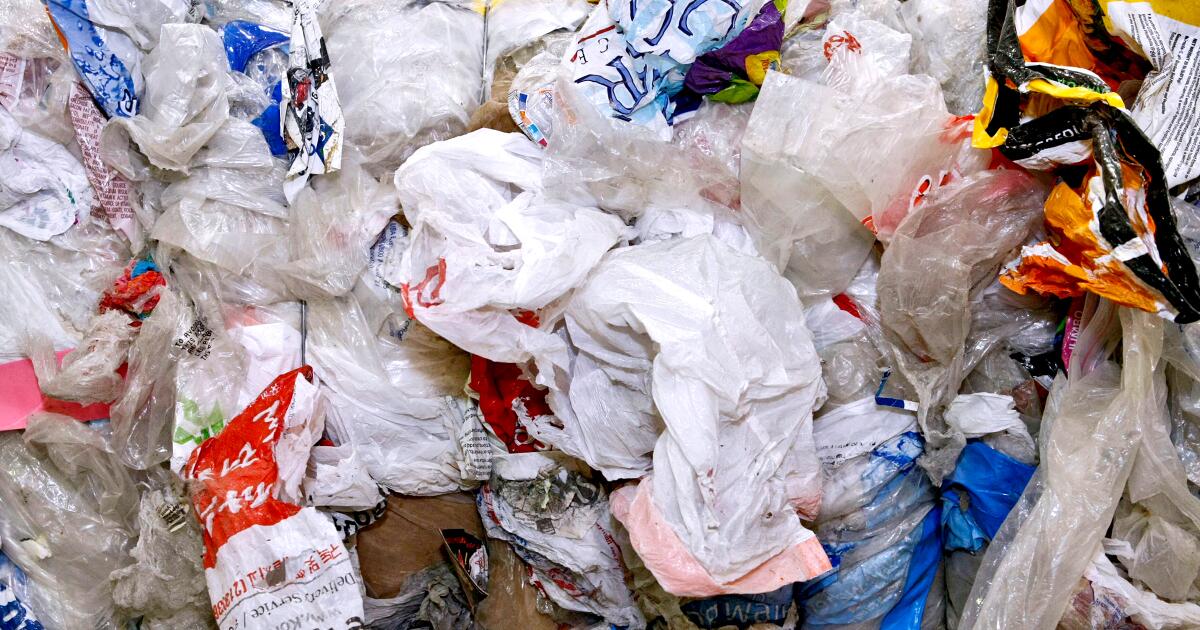It was a decade ago when California became the first state in the nation to ban single-use plastic bags, ushering in a wave of anti-plastic legislation from coast to coast.
But in the years after California seemingly kicked its plastic grocery sack habit, material recovery facilities and environmental activists noticed a peculiar trend: Plastic bag waste by weight was increasing to unprecedented levels.
According to a report by the consumer advocacy group CALPIRG, 157,385 tons of plastic bag waste was discarded in California the year the law was passed. By 2022, however, the tonnage of discarded plastic bags had skyrocketed to 231,072 — a 47% jump. Even accounting for an increase in population, the number rose from 4.08 tons per 1,000 people in 2014 to 5.89 tons per 1,000 people in 2022.
The problem, it turns out, was a section of the law that allowed grocery stores and large retailers to provide thicker, heavier-weight plastic bags to customers for the price of a dime.



That’s cause we didn’t actually ban them. Neo Liberals thought people would stop using them if they had to pay 10 cents.
Turns out, nobody cared. We need an actual ban.
Not OP, but that’s what we did in the UK too… I’m honestly confused reading the post and the comments calling California out on this. I must be misunderstanding something because we did the same thing and it really, really worked. The UK led the charge on the concept of ‘nudges’ like this and it’s been successful and widely praised. We still have thick plastic bags that you buy for 10p, but most people really do keep some on hand for most situations so plastic dumping has been significantly reduced.
Somewhere a Social Anthropologist is lining up their PhD paper.
The ‘nudges’ thing is contested. It’s basically from one book and the studies that used it mostly showed temporary single digit differences. Then there’s a lot of celebration that “the rate of change is picking up!” before long term effects fail to emerge. It falls smack dab in the center of the replication crisis.
A lot more direct action is required to make sizeable changes, like outreach campaigns and actually trying to change people’s minds/behavior.
Fair enough, thank you for clarifying! ‘replication crisis’ were the first words in my head as soon as I saw the top line of your comment haha.
Or one just buys them in bulk and brings their own plastic bags to the store. Cheaper than $.10, still legal.
Plastic grocery bags take up so little space and are so versatile for so many things that would otherwise take thicker more expensive trashbag-like material, or paper or cloth that can’t handle wet.
Replacing them at the store didn’t replace them at the litterbox, at the quick trip to the friend’s house to bring some snacks, at the carpet stain cleanup, at the garage project cleanup, at side of the road car repair, for emergency gloves in a pinch, at stopping liquid leaks in your car’s trunk because some container broke, at the small bathroom trash can at home, and so many other places where those bags can and do get reused a bunch of times. Paper and cloth bags both leak. Cloth bags waste drinking water to clean. Regular trash bags not only cost more, but like this article mentions, are also thicker plastic resulting in more plastic ending up in a landfill.
Not trying to sound pro-plastic grocery bag, just pointing out that they are infinitely useful for so many small tasks, and the replacements can’t hold up to the task, or are worse in several ways. It’s difficult to remove something from peoples’ processes when there aren’t any reasonable substitutes.
Paper probably has the best bet of going back to prevalence since it can be a carbon sink cycle, but it will take time.
What? Cloth bags are vastly superior. You wash them every once and a while with all the rest of your clothes. I just bring them back down to my car so I have them wherever I go. That is by far the best option.
Try putting anything with any liquid on it in a cloth bag and report back bud
What the fuck liquids are you buying in a store and putting in a bag? There are already several other containers made to hold liquids. Bags are not one of them.
Tell that to Canadians and their weird ass milk solutions.
I’m sorry you got downvoted by morons.
It’s okay it happens frequently
There are permanent plastic bags too…
I think the gig economy and the pandemic both had a hand in this as well. The pandemic set things up for curbside pickup and increased the number of people using things like Instacart, and a lot of people who switched to that have stayed on them. But both curbside pickup and Instacart-style services need a convenient way for the collector of goods to get that stuff to the purchaser, so they’re going to buy bags for their deliveree. And the deliveree is going to end up with stacks and stacks of reusable bags that they’re never going to reuse (because they order pickup or delivery). They try to donate them but a lot of places don’t take them, so they end up in the trash.
It could still be a financial penalty, but it should be 10 dollars instead of 10 cents.
That would probably do it